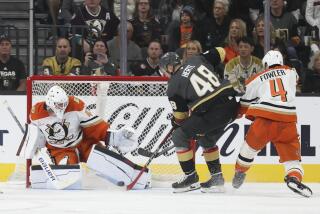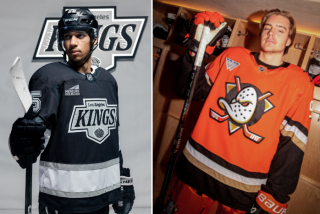How a Southern Californian punk rock song became an Orange County hockey anthem
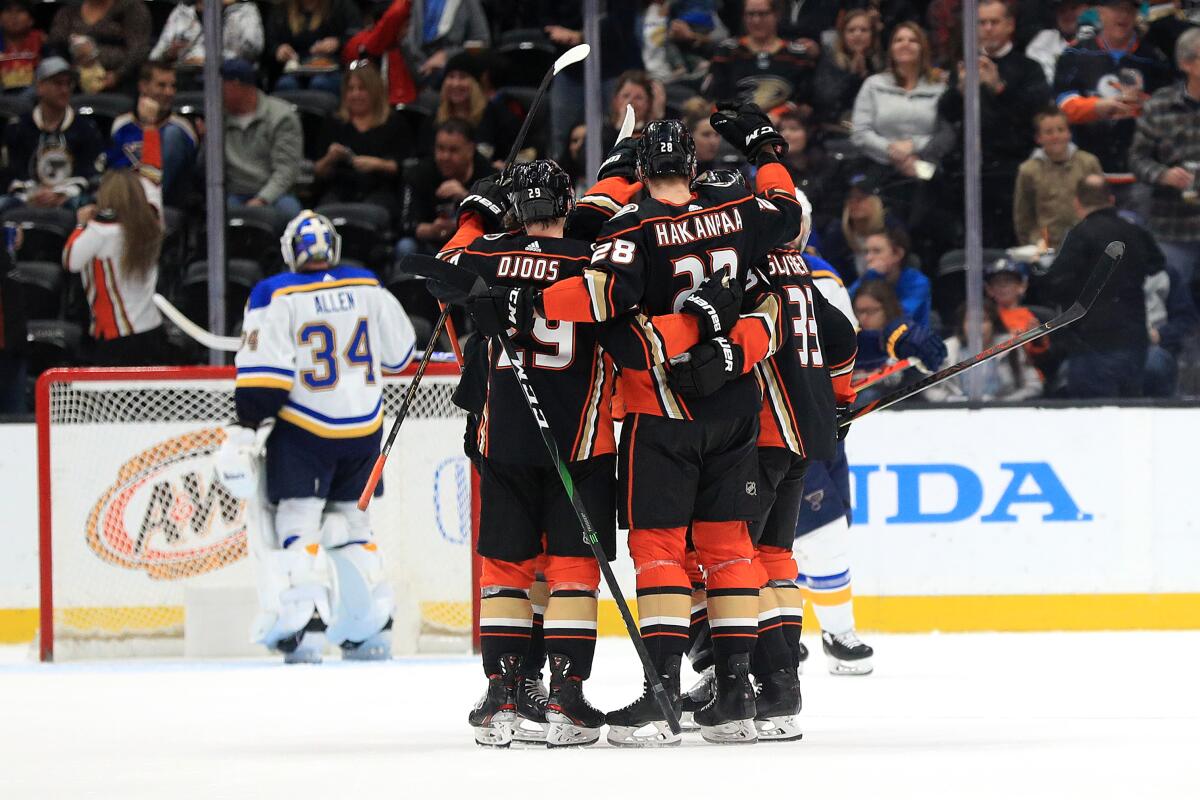
Pennywise frontman Jim Lindberg is pretty direct about his hockey allegiances. “Full disclosure,” he said. “I grew up in Manhattan Beach in L.A. and went to a lot of L.A. Kings games as a kid and was obviously a huge fan and I always will be.” Lindberg said. “I went to a lot of games during the Rogie Vachon, Marcel Dionne era.”
In spite of that fact, Lindberg’s first Stanley Cup celebration came thanks to the Kings’ heated rival, the Ducks. Lindberg wasn’t just watching it. He was on stage, playing with Pennywise, while Ducks players high-fived him, at the team’s celebration outside Honda Center in 2007.
Lindberg and Pennywise wrote and performed the song “Bro Hymn,” which has been the Ducks’ goal song since midway through their 2005-06 season. It became the soundtrack to the Ducks’ 2007 Stanley Cup title and, a decade and a half later is as much a part of the Ducks’ culture as it was then.
When the Ducks opened the 2020-21 season Jan. 14 “Bro Hymn” began its 15th season as the Ducks goal song, making it one of the longest used goal songs by an NHL team. In those 15 years, it’s become more than just a goal song, it’s become a tradition. One that fans feel an ownership of and that former players and Pennywise’s front man remember fondly.
A Mickey Mouse organization
Wayne Gretzky coined the phrase “Mickey Mouse organization” in 1984 referring to the New Jersey Devils, but the Anaheim Mighty Ducks actually were exactly that at their inception in 1993.
Disney, the team’s owners, named the Mighty Ducks after the fictional team from their own film of the same name. Their lack of success in the standings and reputation as Disney’s team even had Bugs Bunny taking shots at them in “Space Jam.”
However, in 2006, a year after Susan and Henry Samueli bought the team from Disney, the Ducks shed the “Mighty” from their name and sought to further distance themselves from Mickey. Part of that involved changing their goal song.
What are goal songs? They’re songs, almost always well-known, that play in NHL arenas after the home team scores and their goal horn sounds.
Nowadays, some teams switch their goal songs on almost a yearly basis while others have songs picked out for individual players.
Many teams utilize not just a single song, but two and sometimes three songs at a time to celebrate a goal.
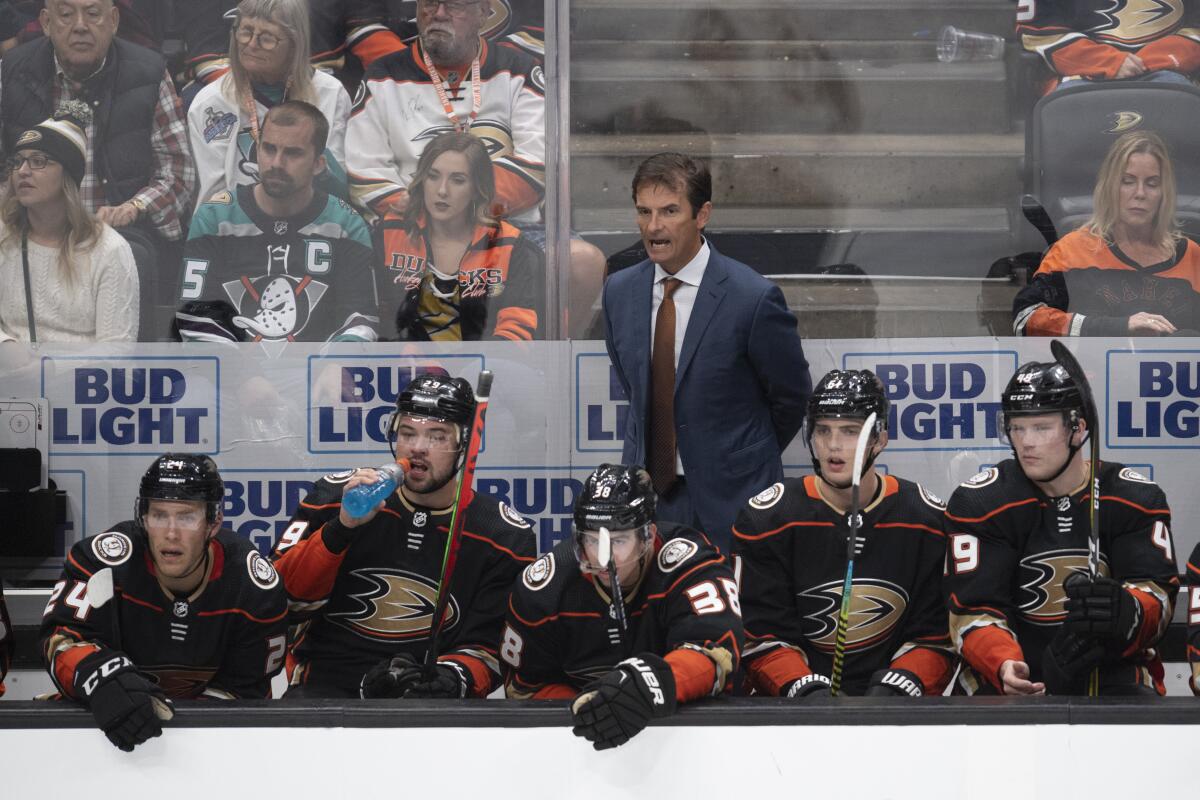
Ducks go local with goal song
Rich Cooley, who is now the Ducks’ director of production and entertainment, was a producer and editor with the team in 2006. He was involved in the selection of “Bro Hymn,” which replaced Kernkraft 400’s “Zombie Nation.”
“It has a really good singalong and an anthem chant kind of a vibe to it,” Cooley said. “There is not a lot of time after the goal is scored before the puck is dropped again so you need something that is recognizable, something the fans can sink their teeth into and is identifiable. For me it was just a really, really good fit.”
But it was more than that. Pennywise was local, hailing from Hermosa Beach, in Los Angeles County, not Orange County, but more on that later. The band formed less than 40 miles from Honda Center, the Ducks’ home arena.
That fact appealed to Cooley and Ducks staff. “Since it’s a local band, it really feels like it belongs to us,” he continued.
Popularized by the skateboarding, surfing and punk music scene of the late ‘80s and early ‘90s alongside other bands like the Offspring and Blink 182, Pennywise’s aggressive brand of music fit perfectly into skateboarding and surfing. Cooley and the Ducks found it fit hockey’s nature just as well.
The song’s lyrics paid tribute to friends of the band who had died tragically. When the band’s bass player and founding member Jason Thirsk took his own life in 1996, the band recorded “Bro Hymn Tribute” in his honor for their album “Full Circle.”
Though the Ducks play the chorus only after they score, it still might be the only goal song in the NHL inspired by tragedy. That doesn’t mean the message of the song isn’t inspiring or upbeat.
According to Lindberg, the song’s message celebrates life.
“It was kind of just a song to remind ourselves to remember the good times and about friendship,” Lindberg said.
That fit perfectly into a team sport like hockey.
Changing lanes in the Freeway Faceoff
The Ducks weren’t the first team to use “Bro Hymn” to celebrate a goal. Lindberg remembers a Belgian soccer team first used the song, which thrilled him. “It was really satisfying to know that people had really taken the song to heart and used it as inspiration for camaraderie,” he said.
When the song caught on in Anaheim, Lindberg and the band took notice. It made for an interesting combination because they are Kings fans.
For anyone who knows hockey, the Freeway Faceoff rivalry between the Ducks and Kings is one of the NHL’s more intense matchups.
But for Lindberg, playing in a band with an international fanbase makes it difficult to be territorial about his sports.
“Our biggest following in the world is in Southern California, but we have fans in Australia, Europe, Japan, all over the place,” Lindberg said. “It’s hard when you’re in a band to have a ‘this town versus that town [mentality].’ When I heard that down in Anaheim the Ducks started using the song as a goal chant, I couldn’t have been happier.”
It caught on quickly in Anaheim likely because the team began a historic run of success.
The season after the Ducks adopted “Bro Hymn” they played it after every goal they scored in Honda Center from their first home game until their last one, Game 5 of the Stanley Cup Final. That win clinched the franchise’s first title and the first for any California team.
At that point, Pennywise became active participants in the title experience.
“I had a friend that was in management for the Ducks and they were obviously having a great season,” Lindberg said. “I was like ‘wow, this thing could really happen, they could go all the way this year.’ They went all the way, so it just felt like natural thing when they asked us, ‘Hey do you guys want to come down and play your song when the team accepts their trophy?’ What were we going to say? No?”
Fond memories of an elite brotherhood
The song means a lot to some former Ducks who experienced it as the soundtrack to their championship.
The Ducks’ Stanley Cup parade featured players arriving via bus and helicopter in front of screaming fans. Pennywise, clad in customized Ducks jerseys, played “Bro Hymn” for the entirety of the time it took the players to get to the stage, which was quite a while. Former Ducks defenseman Kent Huskins remembers the experience vividly.
“Everyone had been partying for like four or five days straight after we won,” Huskins said. “So everyone was just kind of all over the place. It took us a while to get up to the stage. Pennywise were just playing that song for 10 or 15 minutes just waiting for everyone, it was so great.”
Huskins enjoyed Pennywise’s music by the time he reached the NHL. “I listened to some punk and stuff growing up, so I knew who Pennywise was,” he said. “The [song’s] association with that playoff run, it’s a direct association I’ll always have. I’ll always have an appreciation for that song.”
Huskins’ former defense partner Joe DiPenta remembers the song fondly as well.
“It’s exciting. It gives you that jolt,” he said. “I know the co-owner of the Ducks, Henry Samueli is a big music fan, especially rock and heavy metal. He brought that culture to the organization. From playing and being on the ice when we scored, it definitely added to it. It’s a familiar kind of ritual. It helps you relax in your comfort zone. It’s easier to play at home and that’s one of the reasons why.”
DiPenta says he enjoys the fact that “Bro Hymn” was more obscure with local ties.
“It’s neat to have a song like that, that becomes your anthem when you score and to have the band play live during the celebration,” he said. “It’s neat how you can find a gem like the Pennywise’s song that can really become part of your team culture rather than playing a mainstream, say a Metallica song or a song that you hear on the radio 30 times a week.”
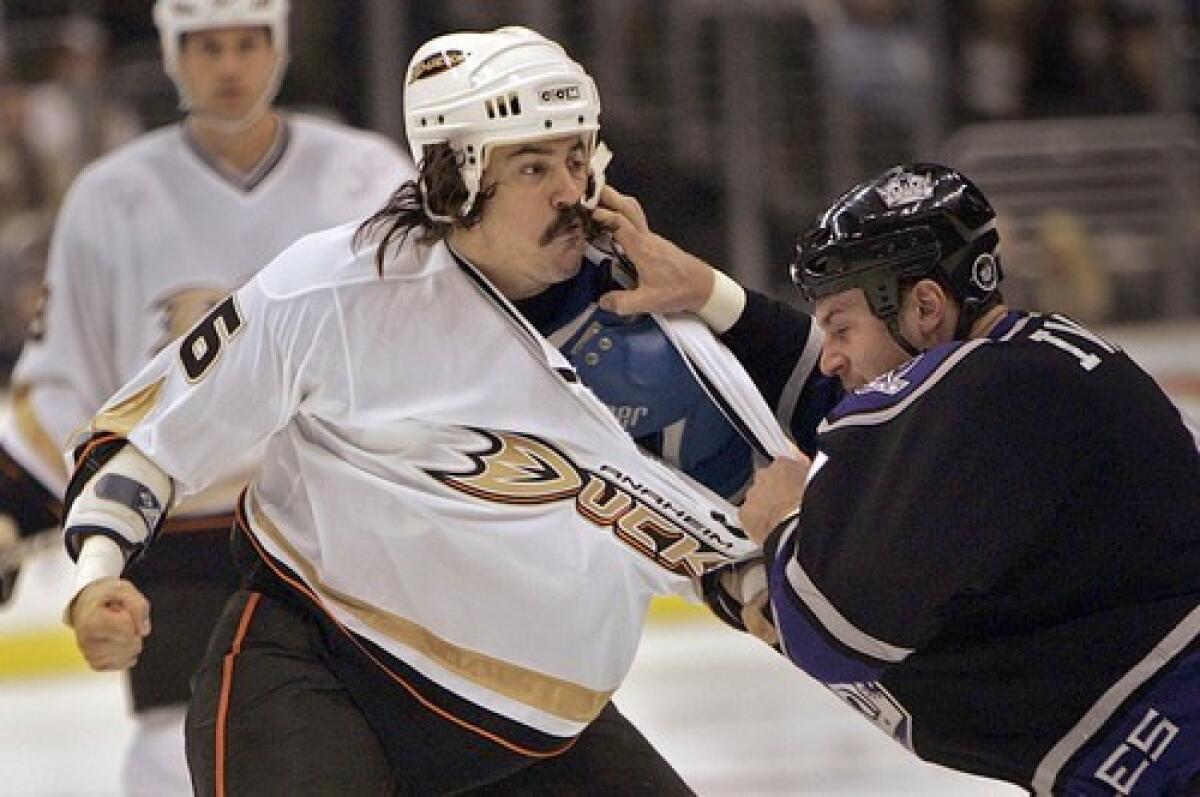
Meeting face to face
George Parros spent the majority of his nine-season career with the Ducks and is now the NHL’s head of player safety. He had an even more face-to-face relationship with the band.
Parros debuted with the Kings in 2005 then played a brief stint with the Colorado Avalanche. After the Avalanche traded him to Anaheim in 2006, Parros moved back to Hermosa Beach, where he got into the local music scene. That’s when a mutual friend introduced him to Lindberg.
“I knew that Pennywise had done the goal song and the guys were from Hermosa,” Parros said. “I ran into them one night and we had a quick little hang and stuff, a little moment of respect and recognition on my part and his part.”
Parros thinks “Bro Hymn” had its effect on some opponents as well. “I think that Anaheim does stand out as one of those teams that has an iconic song,” he said “I remember when I was in Anaheim there was a stretch of, I don’t know, I want to say 23 games, it spanned multiple years where the Calgary Flames had not beaten us in Anaheim. I imagine they were probably pretty sick of hearing that song.”
The Flames went winless in Anaheim for 25 consecutive games, a streak that spanned from 2004 to 2017.
Going strong for 15 years
The most important factor to consider with a goal song is fan reaction. Over the 15 years that “Bro Hymn” has been ringing through Honda Center, Ducks fans have embraced it, even if the band performing it hails from Kings country.
That includes avid Ducks fan and podcast host Danielle “Chip” Lehman.
“What makes the ‘Bro Hymn’ a great goal song is that chorus part,” she said. “The drunker you are the better it sounds when you sing it.”
As for the song’s actual meaning, she agrees with Lindberg about its content.
“I always thought it was kind of funny because the rest of the song is a pretty somber song about somebody passing away but also it’s about brotherhood. I think it still works because in hockey you go through the good times and the bad times and you have your good memories.”
The song is such a part of the Ducks’ identity that fans like Lehman feel more territorial about it than even the band does.
“The Angels use it for home runs, everyone is OK with that,” she said. “The teams are basically neighbors and we are one community. I remember people being upset when the Chargers tried to use it for touchdowns and everyone was like, ‘No no no, you can’t use that. It’s not for you. You’re not part of this club. You can’t.’”
As for its continued longevity with the Ducks, Cooley doesn’t see any reason for it to go anywhere.
“Whenever you talk about something like a goal song, you always wonder when it’s time to change, what do we change it to?” he said. “Identity is a part of it. I really don’t know if or when we will ever change.”
Ciardelli is a contributor to TimesOC.
More to Read
Go beyond the scoreboard
Get the latest on L.A.'s teams in the daily Sports Report newsletter.
You may occasionally receive promotional content from the Los Angeles Times.

